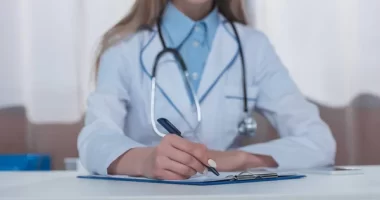DOCS say the AstraZeneca vaccine may be behind three cases of stroke, one of which was fatal.
They warned experts and the public to be wary of symptoms that could suggest the extremely rare side effect, including headaches.

4
All patients had suffered an ischaemic stroke, a common type of stroke caused by a blood clot blocking a major artery to the brain.
It’s the first time the deadly event has been described in people who have been given the jab.
But different types of blood clots have been described in 309 people in the UK, 56 of which resulted in death.
Medicine regulators the MHRA reveal the risk of suffering this complication is tiny – 12.3 events per million doses.
Here is everything you need to know about blood clots linked to the AZ jab.
Stroke linked to AstraZeneca vaccine
Doctors in London detailed the three cases of stroke that are understood to have occurred in the UK.
An Asian woman, 35, died around 11 days after her jab.
A white woman, aged 37, suffered symptoms 12 days after her jab, but was saved.
The third patient, an Asian man aged 43, was admitted to hospital three weeks after his jab and was also treated.
In all cases, the patients had what’s known as an ischaemic stroke caused by blockages of large arteries that supply blood to the brain.
It is the most common type of stroke, typically occurring in people over the age of 55.
All three also had extremely low platelet counts, according to the report in the Journal of Neurology Neurosurgery & Psychiatry.
Blood clots combined with low platelet counts after vaccination have been named vaccine-induced thrombosis and thrombocytopenia (VITT).
Symptoms of stroke to look out for
While it is not yet proven that the vaccine was the cause of these three peoples’ strokes, doctors said it was a possibility.
The team said the NHS must look out for patients with ischaemic stroke within about one month of vaccination.
Getting help as quickly as possible improves chances of survival.

4
The main stroke symptoms can be remembered with the word FAST:
- Face – the face may have dropped on 1 side, the person may not be able to smile, or their mouth or eye may have drooped.
- Arms – the person may not be able to lift both arms and keep them there because of weakness or numbness in 1 arm.
- Speech – their speech may be slurred or garbled, or the person may not be able to talk at all despite appearing to be awake; they may also have problems understanding what you’re saying to them.
- Time – it’s time to dial 999 immediately if you notice any of these signs or symptoms.
The NHS says “other signs and symptoms” may include:
- Complete paralysis of one side of the body
- Sudden loss or blurring of vision
- Dizziness
- Confusion
- Difficulty understanding what others are saying
- Problems with balance and co-ordination
- Difficulty swallowing
- A sudden and very severe headache resulting in a blinding pain unlike anything experienced before
- Loss of consciousness

4
Usually the symptoms of a stroke come on suddenly.
But they may also develop slowly over hours or even days, going unnoticed by those affected.
The patient who died of stroke after her jab had experienced an intermittent headache on the right side and around her eyes six days after having her vaccine.
It wasn’t until five days later she was seen by doctors, when she awoke feeling drowsy and with weakness to her face, arm and leg.
The second patient suffered headache, confusion, weakness in her left arm and loss of vision on the left side 12 days after her vaccine.
The third patient was admitted to hospital after having problems speaking and understanding language.
Other blood clots linked with AstraZeneca vaccine
The MHRA say the link between the AstraZeneca jab and a specific type of blood clotting is “stronger”, after it was first highlighted in March.
Patients have been diagnosed with a type of brain blood clot, known as cerebral venous sinus thrombosis, which is already very rare in the population.
It always occurs with low blood platelets, which experts say is unusual.
There have also been cases of blood clots in veins supplying the abdomen.
Up until May 12, the blood clots have been seen 309 times in roughly 33 million doses, making it extremely rare.
The MHRA states that the risk is currently estimated to be around one in 100,000 for people over 50 and one in 50,000 for people aged between 18 and 49 years.
The rate of death is also extremely low – about one in every 425,000 people vaccinated.

4
Although cases have been seen in every age group, there is a trend towards younger people.
There is now some evidence that the rate is higher in women, too.
Based on this, AstraZeneca vaccines are no longer offered to Brits under the age of 40 years old.
But for the “vast majority” of the population, the “benefits outweigh the risks”.
What are the symptoms of blood clots related to the AstraZeneca vaccine?
The symptoms are not dissimilar to those for a stroke.
If you experience any of the following from around four days after vaccination you should seek medical advice urgently:
- a severe headache that is not relieved with simple painkillers or is getting worse or feels worse when you lie down or bend over
- an unusual headache that may be accompanied by blurred vision, confusion, difficulty with speech, weakness, drowsiness or seizures (fits)
- rash that looks like small bruises or bleeding under the skin beyond the injection site
- shortness of breath, chest pain, leg swelling or persistent abdominal (tummy) pain
Should I get my second dose?
The public have been urged to get their second dose of the AstraZeneca vaccine after their first one to ensure maximum protection.
They will not be able to “mix and match” first and second doses from other drug companies.
If you have a history of blood clots you can still have the vaccine.
There is no evidence that those who have previously had a leg clot, or a clot that has led to a heart attack or stroke, are at increased risk of another one caused by the jab.
The only people who are advised to have an alternative vaccine are those with a history of heparin-induced thrombocytopenia and thrombosis (HITT or HIT type 2) – very rare conditions, according to the British Heart Foundation.
Post source: The Sun








